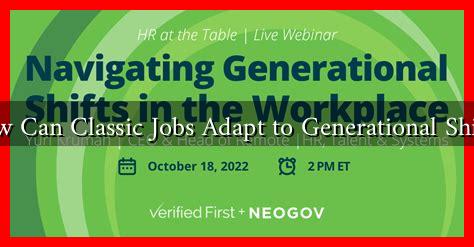-
Table of Contents
- How Can Classic Jobs Adapt to Generational Shifts?
- The Changing Landscape of Work
- Understanding Generational Values
- Strategies for Adapting Classic Jobs
- 1. Embrace Flexible Work Arrangements
- 2. Foster a Purpose-Driven Culture
- 3. Leverage Technology
- 4. Invest in Professional Development
- Case Studies: Successful Adaptations
- Conclusion
How Can Classic Jobs Adapt to Generational Shifts?
As the workforce evolves, so do the expectations and values of its members. With the rise of Millennials and Generation Z, traditional jobs are facing unprecedented challenges and opportunities. This article explores how classic jobs can adapt to generational shifts, ensuring they remain relevant and appealing to a diverse workforce.
The Changing Landscape of Work
Generational shifts in the workplace are not merely a matter of age; they encompass differing values, work ethics, and technological fluency. According to a report by the Pew Research Center, Millennials (born 1981-1996) and Generation Z (born 1997-2012) now make up a significant portion of the workforce. These generations prioritize flexibility, purpose, and technology in their work environments.
Understanding Generational Values
To adapt classic jobs to these generational shifts, it is crucial to understand the core values of the younger workforce:
- Work-Life Balance: Younger generations prioritize a healthy work-life balance, often valuing flexibility over traditional 9-to-5 schedules.
- Purpose-Driven Work: Many Millennials and Gen Z workers seek jobs that align with their personal values and contribute positively to society.
- Technological Integration: Growing up in a digital age, these generations expect seamless technology integration in their work processes.
- Continuous Learning: There is a strong desire for professional development and opportunities for skill enhancement.
Strategies for Adapting Classic Jobs
To meet the expectations of younger generations, classic jobs can implement several strategies:
1. Embrace Flexible Work Arrangements
Organizations can offer flexible work hours and remote work options. A study by FlexJobs found that 80% of workers would be more loyal to their employers if they had flexible work options. Companies like Dell and Salesforce have successfully implemented flexible work policies, resulting in increased employee satisfaction and retention.
2. Foster a Purpose-Driven Culture
Employers should articulate their mission and values clearly, demonstrating how employees contribute to a greater cause. For instance, Patagonia, an outdoor clothing brand, emphasizes environmental sustainability, attracting employees who are passionate about ecological issues.
3. Leverage Technology
Integrating modern technology into classic jobs can enhance productivity and engagement. Companies can utilize collaboration tools like Slack or project management software like Asana to streamline communication and project tracking. A report from McKinsey indicates that companies that adopt digital tools can increase productivity by up to 20-25%.
4. Invest in Professional Development
Offering training programs and career advancement opportunities is essential. Organizations like Google and LinkedIn provide employees with access to online courses and workshops, fostering a culture of continuous learning. This not only enhances employee skills but also boosts morale and loyalty.
Case Studies: Successful Adaptations
Several companies have successfully adapted to generational shifts, serving as models for others:
- Unilever: This consumer goods giant has embraced a flexible work culture and focuses on sustainability, appealing to younger employees.
- IBM: By investing in employee training and development, IBM has maintained its relevance in the tech industry, attracting a younger workforce.
- Airbnb: The company’s emphasis on community and belonging resonates with younger generations, making it a desirable workplace.
Conclusion
As the workforce continues to evolve, classic jobs must adapt to meet the changing expectations of younger generations. By embracing flexible work arrangements, fostering a purpose-driven culture, leveraging technology, and investing in professional development, organizations can attract and retain top talent. The key takeaway is that adaptation is not just about changing policies; it’s about understanding and valuing the diverse perspectives that each generation brings to the workplace. By doing so, classic jobs can thrive in an ever-changing landscape.
For further insights on workplace trends and generational shifts, consider exploring resources from the Pew Research Center and FlexJobs.

